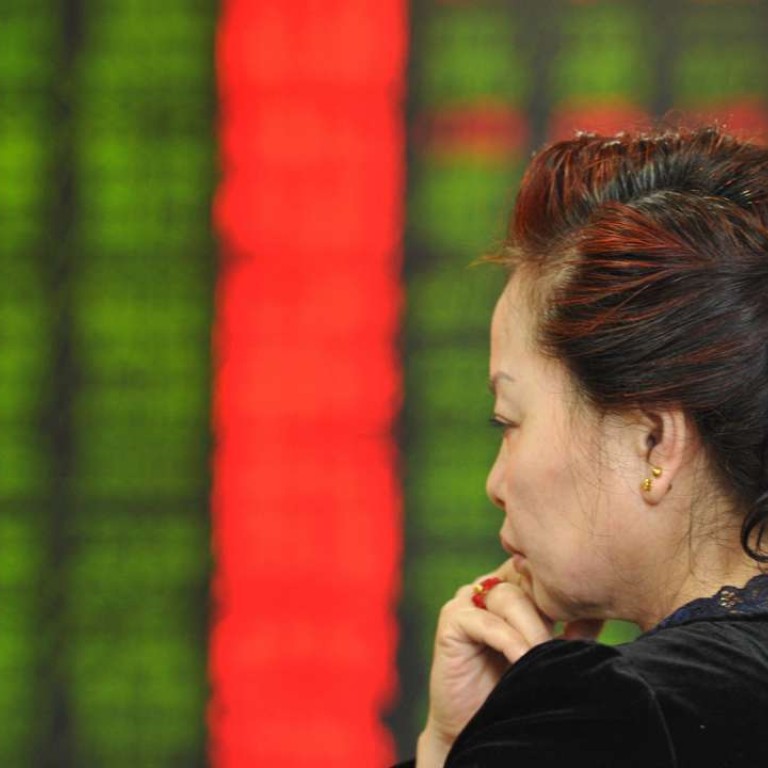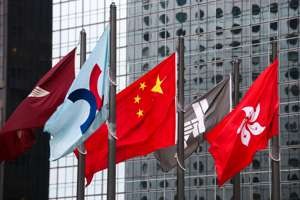
Update | Shanghai stocks in V-shaped rebound amid suspected state intervention, Shenzhen at a 2-year low
Hong Kong stocks end down 1 per cent; Sunac China dives as much as 10 per cent after plan revealed to invest 15 billion yuan in troubled LeEco
Stock markets in China had a volatile day on Monday, as Shanghai stocks staged a V-shaped rebound in late trading, while Shenzhen shares plunged to their lowest close in nearly two years.
Traders suspected state funds had intervened to rescue the benchmark Shanghai index after fears of accelerated new share listings sparked panic selling.
The benchmark Shanghai Composite Index tumbled as much as 2.2 per cent in afternoon trading. It pared back most losses in the final 30 minutes before closing just 0.3 per cent lower at 3,103.43. But it still marked a fifth straight day of losses and the longest losing streak since August 2015.
This is black Monday
The SSE 50 Index, which consists of the 50 largest and most-liquid stocks on the Shanghai Stock Exchange, reversed early losses and advanced 1.3 per cent to finish at 2,337.39.
However, stocks on the Shenzhen Stock Exchange were harder hit. The ChiNext Index, a gauge of start-ups on the Shenzhen bourse, plunged up to 6.1 per cent in the afternoon. It finished 3.6 per cent lower at 1,830.85, the worst closing level since February 2015. The index has now dropped for the eighth consecutive session, the longest losing run since March 2012.
“This is black Monday,” said Liu Chengbin, chief executive for Hongrui Investment.
“Fears that regulators will speed up IPOs this year have sparked massive panic selling,” said Tang Jietian, a stock broker at Huatai Securities, adding that regulators have approved 24 IPO applications in the past fortnight.

He said the real market sentiment may even be worse than what the benchmark index had reflected.
“If you only look at the Shanghai Composite, it doesn’t seem that bad, as the index ended modestly lower. But if you look at the entire stock market, the picture is very different, as more than 2,500 shares fell in Shanghai and Shenzhen, versus only 371 rising, ” Tang said.
“I suspect the national team has pushed up the prices of a few index heavyweights like state-owned banks, to rescue the benchmark from falling too hard,” he said.
“We have to keep a closer watch on stock indexes in Shenzhen to better gauge overall sentiment,” he added.
The Shenzhen Composite Index briefly sank 6.1 per cent, before closing off 3.6 per cent at 1,851.41. The Shenzhen Component Index tumbled 3 per cent to end at 9,712.8, after falling as much as 5.3 per cent.
I suspect the national team has pushed up the prices of a few index heavyweights like state-owned banks, to rescue the benchmark from falling too hard
In Hong Kong, the Hang Seng Index followed mainland stocks lower declining 1 per cent to 22,718.15 at the close. The Hang Seng China Enterprises Index, or the H-shares index, lost 1.2 per cent to end at 9,666.09.
“Hong Kong stocks have rallied for three weeks and I expect to see market corrections. The uncertainty over Brexit brings pressures too,” said Linus Yip Sheung-chi, First Shanghai Securities chief strategist.
There was a wave of capital inflow from developed markets to buy on dips when Hong Kong benchmarks fell below 22,000 after the US announced it would raise interest rates, Yip said.

“But ahead of more US interest rate rises this year, I don’t expect to see more inflows, and it is good that the capital is unlikely to leave the market,” Yip said.
Property developer Sunac China dived as much as 10 per cent and closed lower by 8.1 per cent per cent at HK$6.7, after the company announced its plans to invest 15 billion yuan in the troubled technology company LeEco.
Shenzhen-traded Leshi Internet Information & Technology Corp, LeEco’s listed arm, once climbed 8.9 per cent in early trading but then pulled back and ended down 1.1 per cent at 35.4 yuan.
Among other market movers in Hong Kong, Power Assets Holdings jumped 2.8 per cent to HK$72.5, and Cheung Kong Infrastructure gained 1 per cent to HK$61.55, after a consortium comprising Li Ka-shing’s Cheung Kong Property, Cheung Kong Infrastructure and Power Assets announced a plan to acquire Duet Group in Australia for HK$43 billion.


